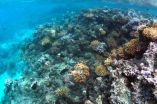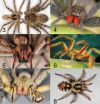Coral reef winners and losers
A study from UCSB's National Center for Ecological Analysis and Synthesis evaluates reef corals' ability to persist over various time scales
2014-10-01
(Press-News.org) Contrary to the popular research-based assumption that the world's coral reefs are doomed, a new longitudinal study from UC Santa Barbara's National Center for Ecological Analysis and Synthesis (NCEAS) paints a brighter picture of how corals may fare in the future.
An NCEAS working group reports that there will be winners and losers among coral species facing increasing natural and human-caused stressors. However, its experts demonstrate that a subset of the present coral fauna will likely populate the world's oceans as water temperatures continue to rise. The findings were published today in PLOS ONE.
Drawn from universities in California (including UCSB), Hawaii and New Hampshire, the 20 scientists in the working group — Tropical Coral Reefs of the Future: Modeling Ecological Outcomes from the Analyses of Current and Historical Trends — sought to understand the future changes in coral reefs motivated by the threat of increasing ocean temperatures.
"This NCEAS working group brought together coral reef experts with diverse perspectives from ecology and paleoecology," said Frank Davis, the director of NCEAS. "The ongoing collaborations have been creative and productive."
To simulate future outcomes, the researchers analyzed contemporary and fossil coral reef ecosystem data sets from two Caribbean locations in the U.S. Virgin Islands and Belize, and from five Indo-Pacific locations in Moorea, Taiwan, Hawaii, Australia's Great Barrier Reef and Kenya. Based on this cumulative knowledge, the team built a trait-based dynamic model to explore ecological performance in a warmer future.
"Although many corals are becoming less abundant, there remain a number of species that are holding their own or increasing in abundance and these corals will populate tropical reefs over the next few centuries," said principal investigator and lead author Peter Edmunds, a biology professor at California State University, Northridge.
The study uses current case studies to describe the events taking place on extant reefs; it also uses fossil records to explain the temporal novelty of the changes affecting the community ecology on these reefs. The investigators' mathematical model provides insight into the future ecological fate of coral reefs under increased thermal stress.
The working group's analysis shows that the winning subset coral species is fast-growing, phenotypically smaller and wider, and more stress-resistant and that it readily produces offspring. Sensitivity analyses also demonstrate that thermal tolerance, growth rate and longevity are predictors of coral persistence when under thermal stress. While this subset of species still supports diversity, a lot is still unknown about its functionality.
"This work is important as it reveals a range of nuanced outcomes for tropical reef corals other than near-complete loss of live coral cover in the face of the current onslaught of environmental assaults," Edmunds said. "While it is unlikely future tropical reefs will provide the same ecological goods and services as the coral reefs of the past, our study provides optimism that some reef corals will persist in a warmer and more acidic future."
INFORMATION:
ELSE PRESS RELEASES FROM THIS DATE:
2014-10-01
PITTSBURGH—The notion of "group selection"—that members of social species exhibit individual behavioral traits that render a population more or less fit for survival—has been bandied about in evolutionary biology since Darwin. The essence of the argument against the theory is that it's a "fuzzy" concept without the precision of gene-based selection.
Jonathan Pruitt, assistant professor of behavioral ecology in the University of Pittsburgh's Department of Biological Sciences within the Kenneth P. Dietrich School of Arts and Sciences, has published a paper today in the ...
2014-10-01
Spiders found in international cargo brought into North America are sometimes submitted to arachnologists for identification. Often, these spiders are presumed to be of medical importance because of their size or similarity to spiders that are known to be venomous.
In 2006, after witnessing multiple episodes where harmless spiders were mistaken for toxic ones, Dr. Richard Vetter, an arachnologist at the University of California, asked other arachnologists to provide data on specimens they found in international cargo that had been submitted to them for identification. ...
2014-10-01
New insights into botulinum neurotoxins and their interactions with cells are moving scientists ever closer to safer forms of Botox and a better understanding of the dangerous disease known as botulism. By comparing all known structures of botulinum neurotoxins, researchers writing in the Cell Press journal Trends in Biochemical Sciences on October 1st suggest new ways to improve the safety and efficacy of Botox injections.
"If we know from high-resolution structures how botulinum neurotoxins interact with their receptors, we can design inhibitors or specific antibodies ...
2014-10-01
WASHINGTON— The Society for Public Health Education (SOPHE) proudly announces the publication of a Health Education & Behavior (HE&B) supplement devoted to the latest research and practice to promote healthy aging. The October 2014 supplement, "Fostering Engagement and Independence: Opportunities and Challenges for an Aging Society," contains a dozen peer-reviewed articles on innovative behavioral and psycho-social approaches to improve the health of the nation's fastest growing cohort - older adults.
Together the articles describe promising advances in research directed ...
2014-10-01
BEIJING; BERKELEY, CA; and UPTON, NY - The Daya Bay Collaboration, an international group of scientists studying the subtle transformations of subatomic particles called neutrinos, is publishing its first results on the search for a so-called sterile neutrino, a possible new type of neutrino beyond the three known neutrino "flavors," or types. The existence of this elusive particle, if proven, would have a profound impact on our understanding of the universe, and could impact the design of future neutrino experiments. The new results, appearing in the journal Physical Review ...
2014-10-01
CUMBERLAND, MD (October 1, 2014)--When scientists talk about the consequences of climate change, it can mean more than how we human beings will be impacted by higher temperatures, rising seas and serious storms. Plants and trees are also feeling the change, but they can't move out of the way. Researchers at the University of Maryland Center for Environmental Science and University of Vermont have developed a new tool to overcome a major challenge of predicting how organisms may respond to climate change.
"When climate changes, organisms have three choices: migrate, adapt, ...
2014-10-01
BUFFALO, N.Y. — If a person is dually diagnosed with a severe mental illness and a substance abuse problem, are improvements in their mental health or in their substance abuse most likely to reduce the risk of future violence?
Although some may believe that improving symptoms of mental illness is more likely to lessen the risk for future episodes of violence, a new study from the University at Buffalo Research Institute on Addictions (RIA) suggests that reducing substance abuse has a greater influence in reducing violent acts by patients with severe mental illness. ...
2014-10-01
New Rochelle, NY, October 1, 2014—Regulation of the human immune system's response to infection involves an elaborate network of complex signaling pathways that turn on and off multiple genes. The emerging importance of long noncoding RNAs and their ability to promote, fine-tune, and restrain the body's inflammatory response by regulating gene expression is described in a Review article in Journal of Interferon & Cytokine Research (JICR), a peer-reviewed publication from Mary Ann Liebert, Inc., publishers. The article is available free on the JICR website.
In the Review ...
2014-10-01
COLUMBIA, Mo. – Relational aggression, or "mean girl" bullying, is a popular subject in news and entertainment media. This nonphysical form of aggression generally used among adolescent girls includes gossiping, rumor spreading, exclusion and rejection. As media coverage has illustrated, relational aggression can lead to tragic and sometimes fatal outcomes. Despite these alarming concerns, little has been done to prevent and eliminate these negative behaviors. Now, University of Missouri researchers have developed and tested an intervention that effectively decreases relational ...
2014-10-01
This news release is available in French and Spanish. The Commission for Environmental Cooperation (CEC) has released a comprehensive report on the changing face of industrial pollution in North America, covering the years 2005 through 2010. This is the first time an edition of the CEC's Taking Stock series, which gathers data from pollutant release and transfer registers (PRTRs) in Canada, Mexico and the United States, has analyzed North American pollutant information over an extended timeframe. To view the report, visit http://www.cec.org/library.
This volume ...
LAST 30 PRESS RELEASES:
[Press-News.org] Coral reef winners and losers
A study from UCSB's National Center for Ecological Analysis and Synthesis evaluates reef corals' ability to persist over various time scales






